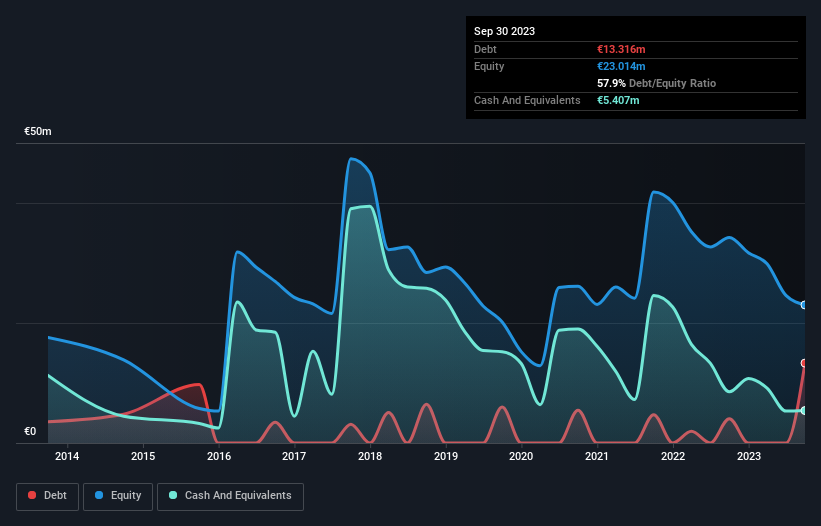The external fund manager backed by Berkshire Hathaway's Charlie Munger, Li Lu, makes no bones about it when he says 'The biggest investment risk is not the volatility of prices, but whether you will suffer a permanent loss of capital.' So it might be obvious that you need to consider debt, when you think about how risky any given stock is, because too much debt can sink a company. Importantly, BRAIN Biotech AG (ETR:BNN) does carry debt. But should shareholders be worried about its use of debt?
When Is Debt A Problem?
Debt assists a business until the business has trouble paying it off, either with new capital or with free cash flow. Part and parcel of capitalism is the process of 'creative destruction' where failed businesses are mercilessly liquidated by their bankers. However, a more common (but still painful) scenario is that it has to raise new equity capital at a low price, thus permanently diluting shareholders. By replacing dilution, though, debt can be an extremely good tool for businesses that need capital to invest in growth at high rates of return. The first thing to do when considering how much debt a business uses is to look at its cash and debt together.
Check out our latest analysis for BRAIN Biotech
What Is BRAIN Biotech's Net Debt?
The image below, which you can click on for greater detail, shows that at September 2023 BRAIN Biotech had debt of €13.3m, up from €4.05m in one year. However, because it has a cash reserve of €5.41m, its net debt is less, at about €7.91m.

A Look At BRAIN Biotech's Liabilities
Zooming in on the latest balance sheet data, we can see that BRAIN Biotech had liabilities of €17.5m due within 12 months and liabilities of €30.4m due beyond that. Offsetting this, it had €5.41m in cash and €9.83m in receivables that were due within 12 months. So it has liabilities totalling €32.7m more than its cash and near-term receivables, combined.
BRAIN Biotech has a market capitalization of €80.8m, so it could very likely raise cash to ameliorate its balance sheet, if the need arose. However, it is still worthwhile taking a close look at its ability to pay off debt. The balance sheet is clearly the area to focus on when you are analysing debt. But ultimately the future profitability of the business will decide if BRAIN Biotech can strengthen its balance sheet over time. So if you're focused on the future you can check out this free report showing analyst profit forecasts.
In the last year BRAIN Biotech wasn't profitable at an EBIT level, but managed to grow its revenue by 12%, to €56m. We usually like to see faster growth from unprofitable companies, but each to their own.
Caveat Emptor
Over the last twelve months BRAIN Biotech produced an earnings before interest and tax (EBIT) loss. Indeed, it lost €5.6m at the EBIT level. When we look at that and recall the liabilities on its balance sheet, relative to cash, it seems unwise to us for the company to have any debt. Quite frankly we think the balance sheet is far from match-fit, although it could be improved with time. Another cause for caution is that is bled €6.9m in negative free cash flow over the last twelve months. So in short it's a really risky stock. When analysing debt levels, the balance sheet is the obvious place to start. However, not all investment risk resides within the balance sheet - far from it. For example BRAIN Biotech has 2 warning signs (and 1 which is a bit unpleasant) we think you should know about.
At the end of the day, it's often better to focus on companies that are free from net debt. You can access our special list of such companies (all with a track record of profit growth). It's free.
Valuation is complex, but we're here to simplify it.
Discover if BRAIN Biotech might be undervalued or overvalued with our detailed analysis, featuring fair value estimates, potential risks, dividends, insider trades, and its financial condition.
Access Free AnalysisHave feedback on this article? Concerned about the content? Get in touch with us directly. Alternatively, email editorial-team (at) simplywallst.com.
This article by Simply Wall St is general in nature. We provide commentary based on historical data and analyst forecasts only using an unbiased methodology and our articles are not intended to be financial advice. It does not constitute a recommendation to buy or sell any stock, and does not take account of your objectives, or your financial situation. We aim to bring you long-term focused analysis driven by fundamental data. Note that our analysis may not factor in the latest price-sensitive company announcements or qualitative material. Simply Wall St has no position in any stocks mentioned.
About XTRA:BNN
BRAIN Biotech
Provides bio-based products and solutions in Germany, the United States, France, the Netherlands, and the United Kingdom.
Excellent balance sheet with reasonable growth potential.
Market Insights
Community Narratives



